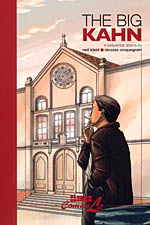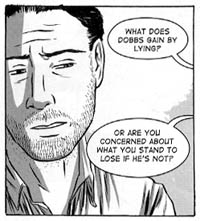 Written by Neil Kleid
Written by Neil Kleid
Art by Nicolas Cinquegrani
176 pages, black and white
Published by NBM
I’ve been looking forward to The Big Kahn ever since Neil Kleid first announced it. The basic concept is one that might have been done before, but to me it sounded so original and smart that it was an instant, "I can’t wait" moment. After all, con men stories are a dime a dozen. Con men stories involving not only religious institutions but a member of your own family? Well, as it turned out, The Big Kahn really was worth the wait.
When Rabbi David Kahn dies, his family expects it to be a normal Jewish funeral. The thing is, it’s at the funeral that the truth really comes out. Their beloved husband and father wasn’t really David Kahn. He wasn’t even Jewish. His real name was Donnie Dobbs and he was a con man who fell in love with one of his marks and never gave up his fake persona of a rabbi. Now, this lie threatens to crumble the foundation that all of their lives were based on. Can any of the Kahns really move on from a 40-year lie?
 Of all the religions for a story like The Big Kahn to be based around, Judiasm seems like the smartest bet to me. Kleid is able to quickly and effortlessly make the Kahn family’s relationship with their religion seem understandable and reasonable. Oldest son Avi is a Rabbi as well, set to take over where his father left off. They live in a predominantly Jewish neighborhood, where Rabbi David Kahn served the entire congregation. This isn’t just a matter of, "I lied about my middle name," but rather something that was at the absolute core of their family. And from there, Kleid hits the ground running and the story never lets up. I was impressed with Kleid’s ability to juggle all four remaining family members (mother Rachel, son Avi, daughter Lea, son Eli) and show how each of them take the news and what it does to them. No one reacts exactly the same, which is exactly how it should be, and I appreciated how some of their paths intersected along the way.
Of all the religions for a story like The Big Kahn to be based around, Judiasm seems like the smartest bet to me. Kleid is able to quickly and effortlessly make the Kahn family’s relationship with their religion seem understandable and reasonable. Oldest son Avi is a Rabbi as well, set to take over where his father left off. They live in a predominantly Jewish neighborhood, where Rabbi David Kahn served the entire congregation. This isn’t just a matter of, "I lied about my middle name," but rather something that was at the absolute core of their family. And from there, Kleid hits the ground running and the story never lets up. I was impressed with Kleid’s ability to juggle all four remaining family members (mother Rachel, son Avi, daughter Lea, son Eli) and show how each of them take the news and what it does to them. No one reacts exactly the same, which is exactly how it should be, and I appreciated how some of their paths intersected along the way.
The main star of The Big Kahn is, easily, Avi. After all, he’s a Rabbi who is suddenly without a congregation, and so much of what he learned about Judiasm was from his father. His crisis of faith is the most compelling to me, in no small part because Kleid really gets inside Avi’s head and helps us understand the turmoil he’s going through. Every action ultimately feels right, even if it isn’t necessarily the choice that the reader might make. All the way up until the ending, Kleid writes Avi in a way that makes him compelling. You want him to succeed, and even when things begin to go in a different path than expected as he starts talking with his uncle the con man, Kleid makes the situation one where you can nod and say, "If that’s what he thinks is right, I’m behind him." The rest of the characters get their own time as well, although of the three of them I think it was Rachel whose story grabbed me the most. With her, Kleid uses the little things to make the reader interested, like running into other ladies at the supermarket who try and subtly check to see if she’s still keeping kosher. Through her and Avi, Kleid takes his reader into a world that they might not have experienced otherwise.
 I’m not familiar with artist Nicolas Cinquegrani, but his art is strong. I like that the Kahn family all look clearly related to each other, without being carbon copies of the same character. He’s got a straight forward style to his pages, which is good in terms of storytelling; he draws Kleid’s script in a cinematic way, with tight focuses on the most important element in a scene, but not afraid to pull back to show the entire area. Cinquegrani has a soft, gentle line in his art, and he uses his gray tones to help provide a bit of extra depth and heft to his drawings. The Big Kahn is the sort of comic that I can see drawing in non-comic-readers, and I appreciate that Cinquegrani’s art will be a good way to ease into this particular art form.
I’m not familiar with artist Nicolas Cinquegrani, but his art is strong. I like that the Kahn family all look clearly related to each other, without being carbon copies of the same character. He’s got a straight forward style to his pages, which is good in terms of storytelling; he draws Kleid’s script in a cinematic way, with tight focuses on the most important element in a scene, but not afraid to pull back to show the entire area. Cinquegrani has a soft, gentle line in his art, and he uses his gray tones to help provide a bit of extra depth and heft to his drawings. The Big Kahn is the sort of comic that I can see drawing in non-comic-readers, and I appreciate that Cinquegrani’s art will be a good way to ease into this particular art form.
The Big Kahn is easily Kleid’s best work to date as a writer; it’s clever and gripping, and there are a couple of turns in the story as it heads towards the conclusion that genuinely surprised me even as they still made sense. This feels in many ways like a turning point in Kleid’s career, and I know I’m not the only one who is eager to see whatever Kleid’s next project is based off of the strength of this graphic novel. It’s a strong slice-of-life story that makes you think, and I’m happy with that. Highly recommended.
Purchase Links: Amazon.com | Powell’s Books
